
A new start-up is taking on the world’s biggest Internet retailer in the battle to deliver ever-cheaper products online.
Amazon is undercutting everyone, from local bookshops to your DIY store. After a food distribution deal it signed with supermarket Morrisons in February, Amazon may even out muscle the supermarket industry. But what if somebody undercuts Amazon?
US e-commerce site Jet.com is aiming to do precisely that. The firm was only founded two years, but was quickly hyped as a threat to Amazon’s business model. A $3.3bn bid from supermarket giant Walmart, which was announced earlier this week, suggests that at least part of that hype was justified.
Jet.com operates a simple business model. Customers get better deals if they buy in bulk. The more items you add to your basket, the further prices fall. Jet makes zero profit on the items it handles, passing them on at cost price, but makes money by charging a slender $50 annual membership fee. So far it has signed
up four million customers.
Jet.com’s founder and Chief Executive Marc Lore has successfully clashed with Amazon before. His previous e-commerce venture, baby-products site Diapers.com, forced Amazon to slash the price of nappies to squeeze his business. Amazon’s baby division was losing $1m a day, but was willing to carry the losses to deter future competition.
Eventually, Amazon bought Diapers.com and Lore’s other e-commerce sites for $545m. In this case another deep-pocketed rival seems to have got there first. Walmart plans to keep Jet separate from its existing online business, but Lore will take charge of both. He is also due to pocket around $750m from the deal.
With 12 million product lines, Jet.com could evolve into a significant rival to Amazon, which already faces wafer-thin margins. Amazon’s sales totalled $107bn last year, having tripled since 2010, but its profit margins are just 0.56%. Rather than lowering its markup, which is typically around 30% per item, Amazon’s founder Jeff Bezos has focused on ever-faster delivery times. For example, the Amazon Prime service charges $99 per annum in the US and £79 per year in the UK, in exchange for a one-day delivery promise.
Jet does not need to compete with Amazon directly, Lore says. Instead, it can become a “very large number two” in the trillion-dollar ecommerce market. Walmart is currently a long way behind Amazon online, handling $14bn of web-based orders last year, rising to $15bn after the Jet deal. But its bricks-and-mortar retail business is nearly five times bigger than Amazon by total sales. Its profit margins are also far wider. Coupling Walmart’s muscle with Jet’s radical online ambitions means that Amazon finally has a serious competitor to contend with.